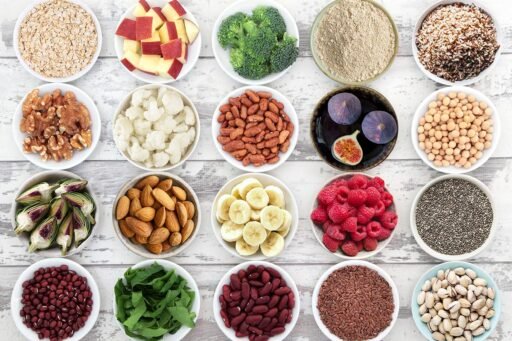1. Promotes Digestive Health
- Insoluble fiber helps to add bulk to stool, which supports regular bowel movements and prevents constipation.
- Soluble fiber dissolves in water and forms a gel-like substance, which can help slow digestion and improve nutrient absorption.
2. Supports Heart Health
- Soluble fiber can help lower cholesterol levels by binding to cholesterol particles and removing them from the body. This can contribute to a lower risk of heart disease and stroke.
- High fiber intake is also linked to lower blood pressure and inflammation, both of which are important for heart health.
3. Aids in Weight Management
- Fiber-rich foods are typically more filling, meaning they can help control appetite and reduce overall calorie intake. This makes fiber an important tool for weight management.
- Additionally, high-fiber foods generally require more chewing, which can slow down eating and increase feelings of fullness.
4. Stabilizes Blood Sugar Levels
- Soluble fiber can slow the absorption of sugar, helping to prevent rapid spikes in blood sugar. This is especially important for people with diabetes or those at risk for the condition.
- A high-fiber diet may help improve insulin sensitivity and reduce the risk of type 2 diabetes.
5. Promotes Gut Health and Beneficial Bacteria
- Fiber acts as a prebiotic, feeding the beneficial bacteria in the gut. A healthy balance of gut bacteria is crucial for overall health, including immune function and mental well-being.
6. Reduces the Risk of Certain Diseases
- A diet rich in fiber is associated with a lower risk of several chronic conditions, including colon cancer, type 2 diabetes, and diverticular disease.
7. Improves Skin Health
- Some studies suggest that fiber can contribute to clearer skin by helping to regulate blood sugar and hormones, both of which can influence acne.
How Much Fiber Do You Need?
The recommended daily intake of fiber varies by age and gender:
- Women: 25 grams per day (up to age 50), 21 grams per day (age 51 and older)
- Men: 38 grams per day (up to age 50), 30 grams per day (age 51 and older)
How to Increase Fiber Intake
- Eat whole grains: Choose brown rice, whole wheat bread, quinoa, and oats instead of refined grains.
- Add legumes: Incorporate beans, lentils, and chickpeas into salads, soups, or stews.
- Snack on fruits and vegetables: Apples, pears, carrots, and broccoli are great fiber-rich options.
- Include nuts and seeds: Almonds, chia seeds, and flaxseeds are excellent sources of fiber.
Conclusion
Fiber is a vital nutrient that plays a crucial role in supporting digestive, heart, and overall health. By including a variety of fiber-rich foods in your diet, you can reap the numerous health benefits it provides.































Pingback: sildenafil citrate tablets ip 50 mg